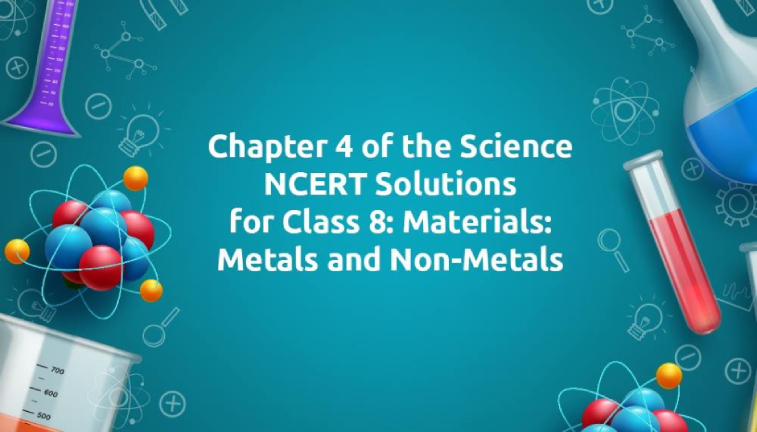Science is all about understanding the materials around us and how they behave. In the NCERT Solutions for Class 8 Science Chapter 4, we will learn about the two main groups of materials – metals and nonmetals. We will also find out about their properties and how they are used in our everyday life.
The materials we come in contact with every day are a combination of metals and nonmetals. The NCERT Solutions for Class 8 Science Chapter 4 will help you understand the properties of these materials and their importance. You will learn about the different types of metals and their properties, such as ductility, malleability, and conductivity. You will also learn about the different types of nonmetals and their properties, such as flammability and reactivity. After reading this chapter, you will be able to understand the importance of metals and nonmetals in our everyday lives. You will also be able to describe how these materials are used in different industries.
Metals and nonmetals are important in NCERT Solutions for Class 8 Science Chapter 4.
Metals and nonmetals are the most significant elements on Earth. They are used in a wide range of industries, from construction to electronics. They have a variety of properties that make them useful for a variety of uses.
Subject professionals produced NCERT Solutions for Class 8 Science Chapter 4 to help in the understanding of ideas. These CBSE Course Class 8 Science explain textbook questions in detail, step by step. It thoroughly covers all of the important concepts to assist students to obtain a better conceptual understanding.
Topics covered in NCERT CBSE Class 8 Science Syllabus Materials Metals and Non-Metals
Section Number Topic
4.1 Physical Properties of Metals and Non-metals
4.2 Chemical Properties of Metals and Non-metals
4.3 Uses of Metals and Non-metals
Students can use the NCERT Solutions for Class 8 accessible in class- and chapter-based formats for rapid reference to understand crucial and challenging concepts. The NCERT Solutions for Class 8 Science Chapter 4 are a great resource for students who want to quickly understand challenging concepts. The class-based format of NCERT Solutions makes them easy to reference, and the chapter-based format ensures that students can find the information they need quickly and easily.
NCERT CBSE Class 8 Science Syllabus
One of the advantages of online education is that students can learn from top-tier teachers from throughout the country. These teachers are typically professionals who have a great deal of experience and who teach like professionals in online programs. One such online program is the Central Board of Secondary Education (CBSE) program. In this program, students can find CBSE Course Class 8 Science notes and question papers for courses such as Mathematics, Biology, Chemistry, and more. With these notes and papers, students can prepare for their exams more efficiently and effectively.
Frequently Asked Questions on NCERT Solutions for Class 8 Science Chapter 4
Q1 – Provide a list of the subjects and subtopics covered in the NCERT CBSE Class 8 Science Syllabus.
A: The following subjects and subtopics are covered in Chapter 4 of NCERT Solutions for Class 8 Science:
4.1 Physical Properties of Metals and Non-metals
4.2 Chemical Properties of Metals and Non-metals
4.3 Uses of Metals and Non-metals
Q2 – What are the metal applications listed in Chapter 4 of NCERT Solutions for Class 8 Science?
A: The metals used in Chapter 4 of NCERT Solutions for Class 8 Science are as follows:
In the Construction Industry
In electronics
In medicine
Machinery, Refractory, and Automobiles
Decorative products
Other Uses
Q3 – Where can I get online NCERT Solutions for Class 8 Science Chapter 4?
A: Geneo has the CBSE Course Class 8 Science Chapter 4 available. These answers have been created by specialists to assist students with their yearly test preparation. The answers include explanations in simple language to help students gain a deeper conceptual understanding.

